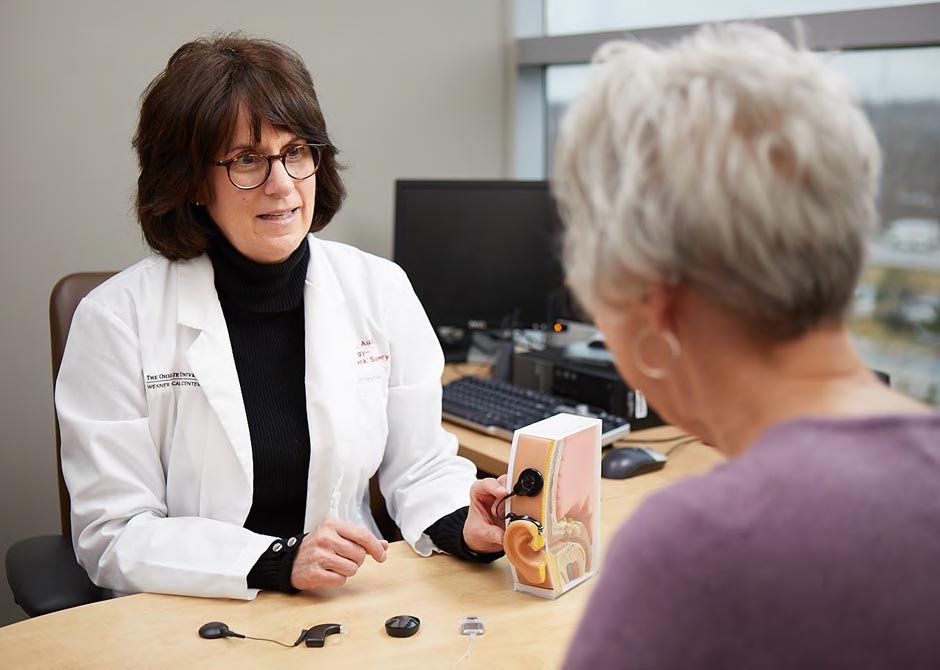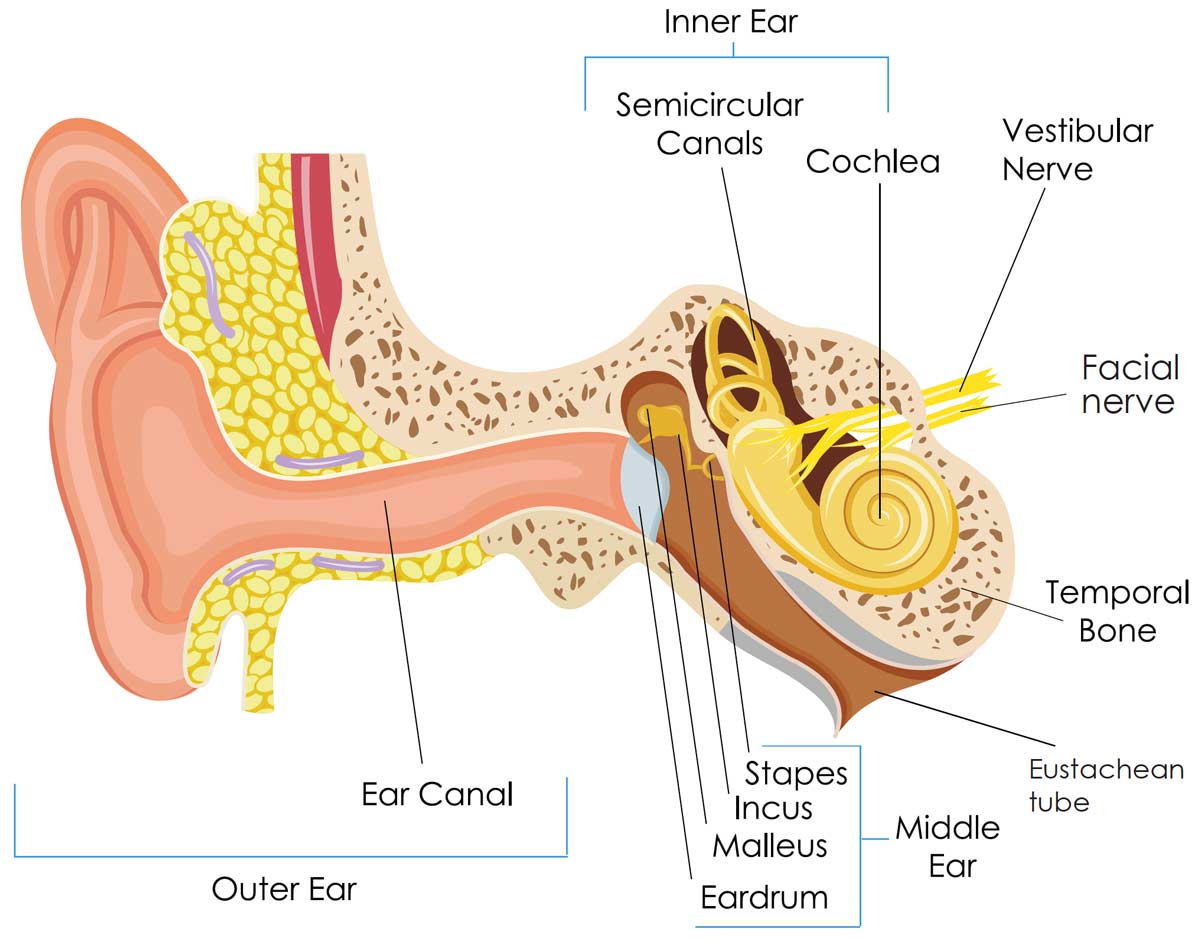 Losing your hearing can be a frightening and isolating experience that affects your career, your relationships and your overall ability to enjoy hobbies and the environment around you.
Losing your hearing can be a frightening and isolating experience that affects your career, your relationships and your overall ability to enjoy hobbies and the environment around you.
Hearing loss is common, however, with more than 20% of adults in the United States experiencing the problem to a degree, so you’re not alone in your struggles. In fact, hearing loss is the third most prevalent physical condition found in Americans, behind arthritis and heart disease.
That’s why the audiologists and ear, nose and throat (ENT) doctors at The Ohio State University Wexner Medical Center strive every day to improve, through research and technological advances, the diagnosis and treatment of those with hearing loss. Our philosophy is simple: Provide you with quality, state-of-the-art audiological services while maintaining an understanding atmosphere for your care.
Hearing is a complex sense involving both the ear’s ability to recognize sound and the brain’s ability to interpret those sounds. Hearing loss can involve one or both of those functions, making the range of causes for hearing loss vast, including genetics, noise exposure and aging.
Our hearing and vestibular (balance) disorder experts treat a variety of conditions related to the ears and our Department of Otolaryngology – Head and Neck Surgery is ranked as one of the best ear, nose and throat (ENT) programs in the country by U.S. News & World Report, so you’ll be in good hands as we work to diagnose the cause of your hearing loss and find ways to restore it.
What are the signs of hearing loss?
Hearing loss generally happens gradually over the course of months or years, so it’s sometimes difficult to tell that you’re losing your ability to hear. Some initial signs that you’re experiencing hearing loss include:
- Your family members say you turn the volume on the television or radio too loud, or you have to use subtitles to understand.
- You often must ask others to repeat what they’ve said.
- You have difficulty hearing when there is noise in the background or in large groups of people.
- You struggle to communicate on the telephone.
- You hear conversation but have a hard time understanding what’s being said.
- You have ringing or buzzing in your ears, which is a condition called tinnitus.
Types of hearing loss
Hearing loss can affect your ears in different ways. When you come in for a physical examination, the audiologist will perform a series of hearing test to determine what kind of hearing loss you have. Types of hearing loss are:

Sensorineural hearing loss (SNHL) is caused by damage to the hair cells in the cochlea or neurons in the auditory nerve. The most common causes of sensorineural hearing loss may include aging and excess noise exposure.
Mixed hearing loss occurs in situations where conductive hearing loss occurs at the same time as sensorineural hearing loss. This means that there may be damage to the outer or middle ear as well as in the inner ear or the nerve pathway that connects the ear to the brain.
Sudden hearing loss happens quickly, without any warning. It’s considered a medical emergency, and it’s important to have it checked by a doctor for causes, which could include a stroke, a viral infection, tumor or Meniere’s disease. Sometimes the cause is unknown, but if you delay care, the hearing loss could be permanent.
Causes of hearing loss
There are many different causes of hearing loss, ranging from noise exposure to aging to diseases and infections. Cause of hearing loss include:
- Age – Most people begin to lose some hearing as they get older.
- Repeated exposure to loud noises – It’s important to wear ear protection if your job or hobbies require you to be in loud environments
- Ear infections – Infections in any part of the ear can lead to hearing problems.
- Buildup of earwax – This can block the ear canal and prevent the conduction of sound waves.
- Ruptured eardrum – Your eardrum can become perforated from loud noises, a change in pressure or foreign objects in your ear.
- Cholesteatoma – Growths behind the eardrum can cause the middle ear bones to malfunction.
- Acoustic neuroma – These noncancerous benign tumors can cause hearing loss.
- Genetics – Hearing loss can run in families or be caused by genetic diseases.
How can hearing loss affect my quality of life?
Hearing loss can affect you personally and professionally since it impairs your communication abilities. You might withdraw socially due to difficulties talking with others, which can negatively affect your confidence, relationships and emotional wellbeing. Hearing loss can also limit your job opportunities or your ability to perform your job.
How is hearing loss diagnosed?
Your doctor will first ask you questions about how you feel your hearing has been impacted and then will do a thorough physical examination of the ear to look for any obvious signs of damage. Your doctor may perform some general hearing screening exams, such as a whisper test or tuning fork tests.
More advanced hearing tests will be done by an audiologist. These audiometer tests involve listening to a series of sounds through headphones to determine what you can and can’t hear. Your doctor and audiologist will work together to diagnose your hearing loss.
Hearing loss treatment
Your hearing test and physical examination will allow us to determine the extent of your hearing loss as well as what might be causing it. Both factors will impact the types of treatment we might recommend.
At the Ohio State Wexner Medical Center, we offer a wide variety of hearing loss treatment options. Some are simpler while others involve surgery. Treatment methods include:
- Medications, like antibiotics for infections and corticosteroids
- Injections of steroids
- Earwax removal
- Hearing aids and other devices
- Surgery
Types of hearing devices
It’s estimated that 28.8 million people in America could be helped by hearing aids. There are several different types of hearing devices available to help you manage hearing loss. Those include:
- Hearing aids – These small electronic devices are worn in or behind the ear and make sounds louder. A hearing aid can help people hear more in both quiet and noisy situations. These can be custom fitted or bought over the counter.
- Cochlear implants – Cochlear implants provide a mechanism for hearing when traditional hearing aids are no longer helpful. They require surgery to be placed inside the ear.
- Bone-conduction devices – These bone-anchored devices provide a better hearing solution for people with ear canal problems, people who cannot wear a hearing aid or those who have single-sided hearing loss. They’re surgically placed and create a sound pathway to the inner ear that doesn’t require sound to go through the ear canal.
Surgical treatments for hearing loss
Besides the surgeries needed to place certain hearing devices, there are several other surgical procedures that can be done to try to restore hearing or correct problems causing your hearing issues. Those include:
- Mastoidectomy – When cells in the hollow, air-filled spaces in the skull behind the ear get infected or inflamed, mastoidectomy surgery is required to remove the infected cells.
- Stapedectomy – This surgery removes one of the hearing bones in the middle ear (the stapes bone) and replaces them with a prosthesis to treat conductive hearing loss.
- Tube insertion – During this procedure, fluid is removed, and a small tube is placed through the eardrum to allow airflow and equalize pressure on the eardrum.
- Tympanoplasty – Tympanoplasty is a surgical technique that patches a ruptured eardrum with your own tissue or synthetic material.
Additional Information
How would you like to schedule?
Don’t have MyChart? Create an account















